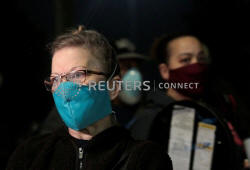U.S. auto industry starts to return to life after
lockdown
 Send a link to a friend
Send a link to a friend
 [May 18, 2020] By
Ben Klayman [May 18, 2020] By
Ben Klayman
WARREN, Michigan (Reuters) - The U.S. auto
industry slowly returned to life on Monday, with some vehicle assembly
plants reopening after the coronavirus lockdown while suppliers geared
up to support a sector that employs nearly 1 million people.
On a chilly and damp Monday morning, hundreds of workers at Fiat
Chrysler Automobile's (FCA) <FCHA.MI> truck plant in Warren, Michigan
began lining up before 4 a.m. to start the 5 a.m. shift. Signs overhead
read: "Let's restart."
"I'm a little nervous," said Larry Smith, 53, of New Baltimore, who
works on wheel alignment away from the assembly line. "They made all the
precautions (and) they've done everything they can to prepare us . . .
I'm trusting in God."
FCA reopened four U.S. assembly plants on Monday, including Warren
Truck, on a single shift, as well as four parts plants.
The reopening of car plants will be a closely watched test of whether
workers across a range of U.S. industries can return to factories in
large numbers without a resurgence of infections.

Auto companies have rolled out safety measures to protect workers,
including the use of temperature monitors for those entering plants,
personal protective equipment such as face masks and shields, and
revamped and deep-cleaned factory floors that emphasize social
distancing and more.
Theresa Segura, 61, of Lincoln Park, arrived for work at the Warren
plant on Monday but was immediately sent home after noting on an FCA
questionnaire that she had been exposed to a family member who had just
tested positive for the virus.
Segura, who has worked at the truck plant since 1993, said she thought
that it was in anycase too soon to reopen "because there are still
people sick out there."
"We're risking our lives going in there," said Segura, who works as a
"floater", moving from job to job at the plant as needed.
General Motors Co (GM) <GM.N>, Ford Motor Co <F.N> and FCA all have been
preparing for weeks to reopen their North American factories in a push
to restart work in an industry that accounts for about 6% of U.S.
economic activity.
[to top of second column] |

FCA assembly workers arrive for an early morning shift re-opening at
the Warren Truck Assembly Plant, as the coronavirus disease
(COVID-19) spread continues, in Warren, Michigan, U.S., May 18,
2020. REUTERS/Rebecca Cook

For the automakers and their suppliers, many of which began reopening their
plants last week, the restart is critical to ending the cash drain caused by a
two-month shutdown that was forced on them by COVID-19.
The emphasis is on getting assembly lines again producing such profitable
vehicles as GM's Chevrolet Suburban SUV, Ford's F-150 pickup truck and FCA's
Jeep Wrangler SUV.
"Ultimately we're in this together. Because if we don't build trucks, Ford Motor
Company is gone," said Todd Dunn, president of UAW Local 862, the union that
represents more than 14,000 hourly workers at Ford's two Kentucky assembly
plants, which build trucks and SUVs.
President Donald Trump on Thursday will tour a Ford manufacturing plant in
Michigan that has been repurposed to make ventilators and personal protective
equipment, according to the White House.
GM is reopening a number of plants on one shift, including 1,600 hourly workers
making pickup trucks in Flint, Michigan, and 1,600 workers manufacturing pickups
in Fort Wayne, Indiana.
The UAW's Dunn said one question will be how many Ford workers punch in at his
local production facilities on Monday given a lack of daycare in Kentucky, where
schools are closed, as well as fear among those with underlying health
conditions who are at greater risk. Ford has been hiring temporary workers to
cover absenteeism, he said.
Another issue automakers will have to watch closely is the financial health of
suppliers. As most suppliers get paid on average 45 days after they deliver
parts, some will struggle to stay afloat as the industry slowly reopens,
analysts say.
(Additional reporting by Nick Carey in Davenport, Iowa; Editing by Daniel Wallis
and Susan Fenton)
[© 2020 Thomson Reuters. All rights
reserved.] Copyright 2020 Reuters. All rights reserved. This material may not be published,
broadcast, rewritten or redistributed.
Thompson Reuters is solely responsible for this content. |